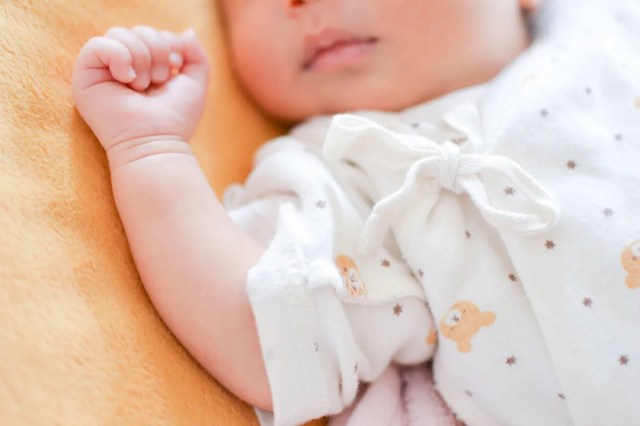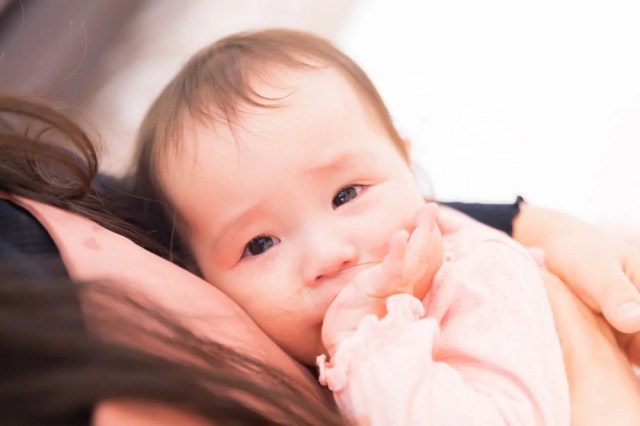
A whole lot of cultural values clash when neighborhood seniors don’t keep their hands to themselves around baby.
In Japan, you can often spot women with a “key holder” (or, more accurately, a small plastic placard strap) attached to their bag, showing an illustration of a baby. This is an indicator that the woman is pregnant, even if she’s not visibly showing yet, and by extension a silent request for use of priority seats on trains or other forms of consideration and understanding.
However, a woman in Saitama Prefecture has a baby-illustration key holder that she only started using after the birth of her child, as a way of telling people not to touch her boy.
In Japan, it’s customary for parents to keep their newborn babies in the house for the first several weeks after coming home from the hospital. After “Ai,” as the mother goes by in the video interview above, started taking her son for walks in the neighborhood though, when he was around three months old, she experienced a problem. “Elderly people would come up to us and say ‘He’s so cute!’ and then, without asking if it was OK, they’d touch his feet.”
After reading on Twitter about other mothers who were dealing with the same sort of situation, Ai decided to make a placard that says “Don’t touch” and has a drawing of a hand reaching towards a distressed looking infant, who has his forearms crossed into an X, the Japanese gesture for “no/don’t.” Ai now clips the placard to her stroller when she’s out with her son, as an in-advance request to strangers to refrain from pats, pinches, and the like.
The idea has proven pretty divisive among online commenters, in part because it touches on (no pun intended) a number of Japanese cultural values. First off, Japan, for the most part, isn’t very big on physical displays of affection, even of the platonic sort like a hug between friends or a pat on the back from a coworker. Most Japanese people would agree that it’s poor manners to touch someone you don’t know, including a baby, so many commenters can sympathize with Ai’s desire to take preventive action.

On the other hand, Japanese culture also has a lot of respect for the elderly, and a general attitude that kids can learn a lot from interacting with people from their grandparents’ generation. A strong sense of community is also a Japanese cultural ideal, as is the idea that early childhood is one of the few times in life when it’s absolutely OK to be showered with affection, before the pressures of school and work make diligent effort a daily requirement.
With all of those concepts floating around in the cultural background, plus hygiene concerns during the ongoing pandemic, reactions to Ai’s “Don’t touch” placard have been all over the board, with comments on Twitter and YouTube including:
“We’ve gone from worrying about our kids being shy around people they don’t know to worrying if they aren’t shying away.”
“Sign of the times. Seems like we’ve lost something important. I understand the mother’s feelings, but still, this makes me sad.”
“The world is weird these days.”
“I can understand where the mom is coming from, and also how the elderly people feel. But thinking logically, no matter how cute you might think a baby is [you shouldn’t touch it without permission].”
“It’s got to be rough having a bunch of people you don’t know touch you.”
“It’d be OK if they’d just ask ‘Can I touch your baby?’”
“Can’t help wondering if the hands of the people touching the baby are clean.”
“Consent is always required for touching!”
Adding another wrinkle to the situation is a recent raised awareness in Japan that some mothers who are out and about with children might need a hand lifting a stroller onto or off the train or getting a shopping bag up onto the parcel shelf. When asked by the interviewer if a “don’t touch my baby” sign will make people less likely to offer assistance in such situations, Ai replies “I think there will be times when I want someone’s help, and when that happens, I’ll ask them for it. [Otherwise] I’d like people to take a step back and [limit themselves to] watch[ing] over us.”
Further complicating the debate is the fact that touching a stranger’s baby is already something that most people in Japan refrain from doing, causing some to see the placard as needlessly standoffish and/or ineffective; most people wouldn’t be trying to touch the baby anyway, and those who do aren’t likely to notice or pay attention to the sign, they say. A few people even expressed skepticism that the soft, pastel colors of the sign will be noticeable to the elderly people Ai wants to be aware of it.
Still, the placard seems to be having the desired effect, since Ai is continuing to use it, so anyone who sees it, or the kid shown in the video, should keep their hands to themselves.
Source: Asatele News via Yahoo! Japan News, ANNnewsCH, Twitter
Top image: Pakutaso
Insert image: Pakutaso
● Want to hear about SoraNews24’s latest articles as soon as they’re published? Follow us on Facebook and Twitter!

No hay comentarios:
Publicar un comentario